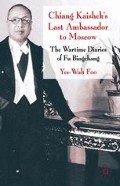Abstract
By the spring of 1944, the Soviets, who were gaining outstanding victories in Europe, saw an opportunity to challenge Chinese authority in Xinjiang. Of course, it was not in Stalin’s interests at this time to directly confront Chongqing, but from March onwards the Soviets retaliated. They supported local border attacks in the region, they printed news articles that supported the Chinese Communists, and others that criticized Chongqing. Chiang, on the other hand, was now in a markedly different position; militarily, he was almost on the verge of collapse. The closure of the Burma Road and Russia’s refusal to allow transit rights through her territory meant that he had virtually no access to foreign supplies for his troops. Worse still, Japan’s huge offensive, code-named Operation Ichigo, was in full force. Over 100,000 armed and highly trained Japanese soldiers were deployed on the mainland to carry out a series of large-scale attacks, with the purpose of linking up a continental corridor through the Hankou-Guangdong railways.1 Chiang could not afford to challenge Soviet pressure in Xinjiang. Moreover, he knew that Soviet support for his regime was imperative, with the looming re-emergence of the Soviet Union as a major power in the Far East. If Chiang did not improve his relations with Moscow, the consequences could be the loss of Manchuria and Xinjiang, Soviet support for the Chinese Communists, and non-inclusion in the Security Council of the incipient United Nations organization.2
Access this chapter
Tax calculation will be finalised at checkout
Purchases are for personal use only
Preview
Unable to display preview. Download preview PDF.
Author information
Authors and Affiliations
Copyright information
© 2011 Yee Wah Foo
About this chapter
Cite this chapter
Foo, Y.W. (2011). Governor Sheng. In: Chiang Kaishek’s Last Ambassador to Moscow. Palgrave Macmillan, London. https://doi.org/10.1057/9780230297692_10
Download citation
DOI: https://doi.org/10.1057/9780230297692_10
Publisher Name: Palgrave Macmillan, London
Print ISBN: 978-1-349-36923-2
Online ISBN: 978-0-230-29769-2
eBook Packages: Palgrave History CollectionHistory (R0)

